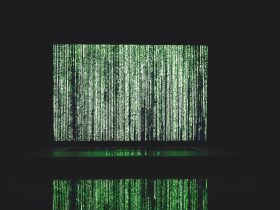what makes a good business magazine.
Quantum computing poses a unique threat to modern cybersecurity measures. This cutting-edge technology can process vast amounts of information exponentially faster and effectively than traditional computers, potentially rendering many existing security protocols futile in the face of quantum-powered cyber-attacks.
Furthermore, it could easily decipher encrypted systems that typically take conventional computing millennia to crack – making most encryption methods virtually useless.
In contrast, quantum computing also forges fresh opportunities for creating almost unbreakable defense mechanisms.
The concept of quantum cryptography is built upon principles like quantum superposition and entanglement creating encryption keys with a complexity level currently unimaginable for ordinary computers.
When leveraged properly, this could elevate cybersecurity infrastructures into an impervious fortress against unauthorized infiltrations.
It’s clear that with every threat posed by quantum computing comes an equally potent antidote – turning this burgeoning field into a double-edged sword whose handle society now needs to grasp responsibly and wisely.
Understanding Quantum Computing
Quantum computing, a term that exudes an air of mystique, is at the frontier of technology, promising to revolutionize our approach to processing power.
While traditional computers rely on bits represented by 0s and 1s, quantum computers use quantum bits or qubits which can be in a state of both 0 and 1 simultaneously. This phenomenon known as ‘superposition’ opens up parallel pathways for computation greatly outpacing their classical counterparts.
The potential applications for quantum computing are staggering. It can tackle sophisticated simulations, optimize complex systems and break many modern encryption algorithms. However, building quantum machines is immensely challenging due to issues like ‘quantum decoherence’.
The inherent sensitivity of qubits requires maintaining them in strictly controlled environments – any interaction with the exterior world brings about a collapse of superimposed states into classical ones.
Yet despite these hurdles, advances in this groundbreaking field have been impressive; holding immense promise for future technologies remarkably different from what we know today.
The Science Behind Quantum Computing
Quantum computing operates on the astonishing principles of quantum physics. Traditional computers rely on data encoded into binary digits (bits), each of which is always in one of two definite states (0 or 1).
Quantum computing, however, steps beyond this binary constraint with the introduction of quantum bits known as qubits.
A single qubit is unique as it can exist in both states simultaneously, thanks to a quirk called superposition.
This extraordinary feature allows quantum computers to handle operations at speeds exponentially faster than their classical counterparts and solve complex problems deemed impossible previously.
Another fascinating element is quantum entanglement; two entangled qubits become intricately linked and instantaneously influence each other regardless of distance.
This phenomenal property has critical implications for fields like cryptography and secure communication.
Peeling back the layers, we unravel not just a new technology but rather an entirely new perspective on computation.
Traditional Computing vs. Quantum Computing
Quantum computing is poised to revolutionize the landscape of information technology, fundamentally challenging the foundations believed by traditional computers.
Unlike classic computing that operates on binary bits (either 0 or 1), quantum computing utilizes quantum bits or qubits, intrinsically expanding its computational universe.
A single qubit can embody both 0 and 1 simultaneously thanks to a property called superposition, delighting in abstruse physics.
To accentuate this further, consider another trademark feature exclusive to quantum computing: entanglement.
Imagine two entangled qubits from a shared state; they remain interconnected even if separated at opposite ends of the universe!
Now amplify this picture with countless twined qubits operating coherently – an illustration hinting at the enormous potential for speed and concurrent processing our conventional computers can only dream of achieving.
Quantum computing magnifies complexity while promising extraordinary capabilities beyond traditional computational paradigms.
How Quantum Computing Affects Cybersecurity
The advent of Quantum Computing ushers in a new era that questions the current standards of cybersecurity.
With its potential to process and decrypt even the most complex algorithms at an unparalleled speed, Quantum Computing threatens to turn our conception of security on its head.
Today’s most sophisticated encryption methods could become as easy to break as a simple password, leaving personal and corporate data more vulnerable than ever.
Immense computing power undermines familiar approaches to cybersecurity but also paves way for quantum-based protection measures.
New cryptographic techniques are being developed using quantum principles such as superposition and entanglement, offering unprecedented resilience against cyber attacks.
In this intricate dance between threat and defense, Quantum Computing isn’t just shaping the future – it is fundamentally transforming our understanding of digital fortifications in the connected world. Will it be Pandora’s box or a sanctuary shield? Only time will tell.
Potential Threats from Quantum Computers
Quantum Computing’s potential is indisputably immense, but as we rush headlong to embrace its benefits, it is prudent also to acknowledge the shadows that accompany this light. A principal concern in this revolutionary realm is data security.
Current encryption techniques guard the world’s most sensitive information, from state secrets to personal credit card numbers.
However, with quantum computing power’s exponential rise and ability to solve complex calculations rapidly, a threat looms large over traditional cryptographic systems.
Furthermore, Quantum Computing could dramatically reshape cyber warfare tactics. Imagine a scenario where an entity wielding quantum technology launches attacks undetected or disrupts crucial infrastructures at an unprecedented scale – indeed a chilling prospect!
What sets these future threats apart from contemporary challenges are their potential magnitude and speed: actions marked by unthinkable levels of devastation completed before anyone even realizes what happened.
Protective Measures against Quantum Threats
As the race towards quantum supremacy accelerates, so does its threats to cyber security. Unsurprisingly, quantum computing’s promise to outperform classical computing in speed and efficiency also poses significant risks.
Ignoring the upcoming era of Quantum Computing may leave individuals and businesses defenseless against sophisticated cyber-attacks capable of jeopardizing privacy and data integrity.
Hence, it is paramount to invest time and resources into aligning our cybersecurity protocols with impending quantum advancements.
Advancements in quantum cryptography and encryption algorithms show that we are moving towards a new era, where security models face new challenges but remain relevant to them.
Redesigning our protective measures now ensures that we stay one step ahead of these powerful technologies, waging off future threats while democratically harnessing the potential of Quantum Computing.
Conclusion: The Future of Security in Quantum Era
In conclusion, the advent of quantum computing fundamentally disrupts traditional security categories, thus dazzling us with new horizons.
New paradigms such as quantum cryptography and advancements in encryption algorithms that can withstand quantum machines indicate that we are marching towards an undiscovered future – heralding a Quantum Era where security models are not obsolete but invigorated by unprecedented challenges.
As we edge into this unstoppable tide of transformation, staying ahead is vital to safeguarding our digital world.
Leaning into this new frontier requires creativity and agility from technologists as they reestablish world-wide-web’s integrity against much sophisticated threats.
The future beholds a paradigm shift ushered by the Quantum Era. Brace for it – for it isn’t simply the future of cybersecurity; it’s a revolution shaking the very foundation upon which our digital society stands today!













